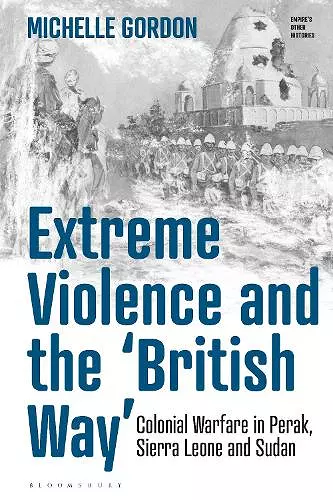Extreme Violence and the ‘British Way’
Colonial Warfare in Perak, Sierra Leone and Sudan
Format:Paperback
Publisher:Bloomsbury Publishing PLC
Published:21st Apr '22
Currently unavailable, and unfortunately no date known when it will be back

A study of colonial violence and warfare across the British Empire, focusing on three case studies; the Perak War, the ‘Hut Tax’ Revolt in Sierra Leone and the Anglo-Egyptian War of Re-conquest in the Sudan.
Analysing three cases of British colonial violence that occurred in the latter half of the 19th century, this book argues that all three share commonalities, including the role of racial prejudices in justifying the perpetration of extreme colonial violence. Exploring the connections and comparisons between the Perak War (1875–76), the ‘Hut Tax’ Revolt in Sierra Leone (1898–99) and the Anglo-Egyptian War of Reconquest in the Sudan (1896–99), Gordon highlights the significance of decision-making processes, communication between London and the periphery and the influence of individual colonial administrators in outbreaks of violence.
This study reveals the ways in which racial prejudices, the advocacy of a British ‘civilising mission’ and British racial ‘superiority’ informed colonial administrators’ decisions on the ground, as well as the rationalisation of extreme violence. Responding to a neglect of British colonial atrocities within the historiography of colonial violence, this work demonstrates the ways in which Britain was just as willing and able as other European Empires to resort to extreme measures in the face of indigenous resistance or threats to the British imperial project.
Michelle Gordon’s history of violence in the British Empire is an important corrective to a traditional historiography which regards such violence as the exception rather than the rule. Gordon demonstrates instead, using the insights of genocide studies, that extreme violence was essential to the establishment and maintenance of control in the British empire. That violence was often knowingly outside of the legal conventions of warfare and included the targeting of potential resistance before the event, collective reprisals including scorched earth policies and the destruction of civilian communities. Ultimately Michelle Gordon requires us to write violence back into the history of the British Empire, which often held the potential for genocide. * Tom Lawson, Professor of History, Northumbria University, UK *
Starting with questions that come from genocide studies and applying them to the much-neglected problem of violence and atrocity in the British Empire, Michelle Gordon has written a powerful work of historical inquiry. Extreme Violence and the 'British Way' will generate much debate and lead to further research into an issue that remains highly relevant for today's world. * Dan Stone, Professor of History, Royal Holloway, UK *
This important book shows that rather than constituting an occasional ‘excess’, extreme violence was a characteristic trait of Britain's empire. Michelle Gordon convincingly attributes extreme imperial violence to its ‘exemplary’, punitive-cum-‘pre-emptive’ function. Britain's presence produced resistance that was used to justify the most brutal ‘pacification’ in the name of civilisation. * Donald Bloxham, Richard Pares Professor of History, The University of Edinburgh, UK *
ISBN: 9781350202603
Dimensions: unknown
Weight: unknown
268 pages